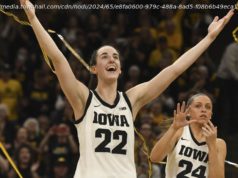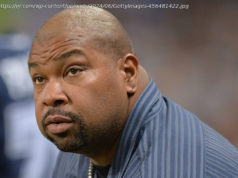The Americans made sure they didn’t go home empty-handed in what might have been the last major game for some of the team’s biggest stars.
The Americans made sure they didn’t go home empty-handed in what might have been the last major game for some of the team’s biggest stars. By Andrew Das It could not, even at the end, even when they were nearly across the line, be easy. Not this year. The United States women’s soccer team came to the Tokyo Olympics in search of the gold medal. It is the prize the team always expects, the reward it always believes it deserves. This time, though, the opponents were better, the performances were worse, and so were the results. Until Thursday, that is, when they needed one last win, one last stand, in the bronze medal game to make something out of what could have been nothing. The medal arrived in due course, delivered with a 4-3 victory against Australia powered by two of the team’s oldest players, Megan Rapinoe and Carli Lloyd, who both scored two goals in what might have been their final game in a major tournament. And yet even then, the prize still nearly slipped from the Americans’ hands, as Australia cut a three-goal lead to two, and then one, and then pressed to erase it completely against a U.S. team reduced to 10 players by a late injury. “That bronze means so much,” the United States captain Becky Sauerbrunn said. “It feels like we really had to earn that thing. And we’re very proud of it.” It had not come easily. For the U.S. players, the Tokyo Games had been an Olympics to forget. Arriving on the heels of a 2019 World Cup championship and eager to prove that their medal-free visit to the 2016 Rio Games was an aberration, the team landed in Japan more than a week before the Olympics and talked of nothing but chasing the gold from the start. The players had been here before; their coaches had not. So they had warned their coach, Vlatko Andonovski, that the Games would not be like the string of easy exhibitions and risk-free friendlies that had made up most of the first year and change of his tenure. “It’s different,” he said the team’s veteran players had warned him in private meetings before the Olympics. “They were trying to prepare me.” A loss to Sweden in the opening game, a defeat so comprehensive that it raised questions about whether the Americans were good enough (or young enough) to even make the medal round, was not a good start. A lopsided win over New Zealand changed the narrative but not the mood, and a dreary scoreless tie against Australia even surfaced some locker-room critiques of the game plan. “We got slapped in the face and then really couldn’t find our way,” Lloyd said. But in the quarterfinals the United States showed the grit that has been the team’s calling card for decades, and that made the players think gold might still be possible. They shocked the Netherlands — the highest-scoring team in the tournament by a wide margin — and then set their sights on an old rival, Canada, that they had long dominated. But against the Canadians, the disconnections and the frustrations returned — Rapinoe talked of a team “missing its joy” — and a late penalty rearranged the Americans’ hopes again. The seeds of victory over Australia on Thursday were sown in a players-only meeting on Tuesday, the day after the Canada defeat. In an open forum that aired complaints and encouragement and criticisms, “truths” were shared, Sauerbrunn said. But the team also found itself in that room, she and Lloyd and Rapinoe agreed. “Obviously we wanted to get a gold medal,” Sauerbrunn said. “Everyone wants to get a gold medal, Americans love golds. The fact is we potentially didn’t deserve to get a gold medal. “We had to change the goal, and it became, ‘Let’s get that bronze.’” Only a bronze was possible at that point, and so the United States dutifully hopped on a bus and went to Kashima to go about trying to collect it. Rapinoe, starting alongside Lloyd up front, got things started by scoring directly from a corner kick in the eighth minute. In an instant, the “joy” she said had been missing all tournament had returned. Sam Kerr answered off a defensive mistake in the 17th minute, the first hint that Australia would not go quietly, but Rapinoe added her second in the 21st, with a stunning one-time finish off a sliced clearance. By halftime it was 3-1, thanks to a precision finish by Lloyd, and six minutes into the second half the lead was 4-1 when she added her second. It felt, then, that the medal was in the Americans’ hands, that their world was back on its axis. But the hard work was not yet done. Caitlin Foord scored on a header and then Emily Gielnik fired in a long-distance rocket as the clock ticked past 90 minutes, and suddenly a new kind of disaster loomed for the United States. But only for a moment: The defense tightened, the dangers were cleared, the last moments ticked away. When the whistle blew, the celebrations were loud for a moment and then quickly muted, smiles and hugs rather than delirium and dancing. The United States had come for gold, after all, not bronze. But Lloyd — the Americans’ most decorated, most seasoned, most respected player — soon made clear that bronze, for this team, and in this moment, qualified as success. “Obviously we were striving for gold,” she said. “But as I’ve told the group, when you get third place at a World Cup, you get a little chintzy medal from FIFA. This isn’t chintzy. It’s just a different color. But not everybody gets them, and it’s truly special, and we had to dig really deep to get it today.” Now that it has it, the team may be headed into a period of transition. Lloyd is 39, and Rapinoe and Sauerbrunn are 36. Each will have to decide if she is willing to make another multiyear commitment to the program ahead of the 2023 World Cup in Australia and New Zealand and the 2024 Paris Olympics. Rapinoe said she would talk it over with her partner, the basketball star Sue Bird, who is weighing a similar decision at age 40. Sauerbrunn said she would go home and talk to the people closest to her. Lloyd said she would wait a bit. “First I’m going to take two or three days and sit by my pool and not move,” she said. “Maybe four.” Those decisions can wait, at least for now. On Friday, the U.S. players will go to Yokohama to collect their bronze medals after Sweden and Canada play for the gold. It will not be the medal they will have wanted, but it will represent more than a lovely parting gift. “Yeah, it’s not a gold,” Sauerbrunn said, “but that bronze means a lot.” Women’s Bronze Medal Match Andrew Das The U.S. players stream off the bench but the shouts and the running give way to exhaustion almost immediately. Smiles, more than dancing. Relief, more than revelry. Andrew Das FULL TIME: The United States has won the bronze! Andrew Das 90′ + 3 Alex Morgan injured late, and has to be helped off. That’s important: The U.S. is out of subs. They will try to finish off Australia with 10. Andrew Das 90′ + 1 Four minutes of added time. Andrew Das 90′ GOAL! Late drama!! Emily Gielnik, a second-half sub for Australia, walks right up the middle and unleashes a shot past Franch from distance. It’s 4-3 now, and getting very nervy in Kashima. Andrew Das 87′ Emily Sonnett on for Christen Press, a defensive move. But Alex Morgan is in again. She can’t get her feet sorted, though, and fails to drive in the dagger. Andrew Das 87′ A Lavelle cross from a tight angle, a Morgan leg stretched as far as it goes… but no. The game stays at 4-2. Andrew Das 80′ Carli Lloyd off, for maybe the final time in a major tournament, and replaced by Alex Morgan. She leaves with two goals today, and the satisfaction that she did everything in her power to help her team to a bronze medal. The others will have to close it out. Andrew Das 75′ An Australia corner forces the U.S. goalkeeper Adrianna Franch to tangle with the tall Emily van Egmond on a high ball. But Franch, thankful she is able to use her hands, gets higher and wins it easily. Crisis averted for the U.S. Andrew Das 74′ Carli Lloyd nearly in again there, on another near-perfect chip by Christen Press. Australia’s Teagan Micah read it and got there first, but don’t rule out a third for Lloyd yet. What a motor on her. Andrew Das 70′ GOAL? No goal. Lloyd was offside before her finish, and clearly so. That is the 10th — 10th! — goal of this tournament that the Americans have had called back for offside. Andrew Das 67′ Three subs for Australia. Raso, Logarzo and Simon come off. Mary Fowler, who was very good in the first game against the U.S. in these Games, is on, for Simon on the right wing. Andrew Das 65′ Lloyd nearly got her hat trick there. Allowed to walk in on the left(!) she sets up a right-footed shot but sends it right at Micah, who falls on it. Lloyd will be disappointed with herself there. Andrew Das 64′ Observation: If you are the U.S., Australia is winning far too many headers in your penalty area. If you are Australia, of course, this is fine. Andrew Das 61′ Lavelle is in fact first on, for Sam Mewis, who was just shaken up. Tobin Heath comes on, too, for Rapinoe, who didn’t look thrilled. None of the forwards would even look toward the bench, fearful of seeing their number come up on the board. Andrew Das 59′ As we approach the hour, Rose Lavelle is up and lingering near the midfield line. She’ll be on for the U.S. in a second. By Andrew Das Caitlin Foord takes advantage of the glow of Carli Lloyd’s goal to immediately answer for Australia. The U.S. defense, plainly, lost her in the area, and she meets a cross with a header. Just like that,4-1 is now 4-2. A minute later, Sam Kerr almost gets another. But her header, on an eerily similar cross to an similarly unmarked head, hits the post and bounces back across the goal and out.






